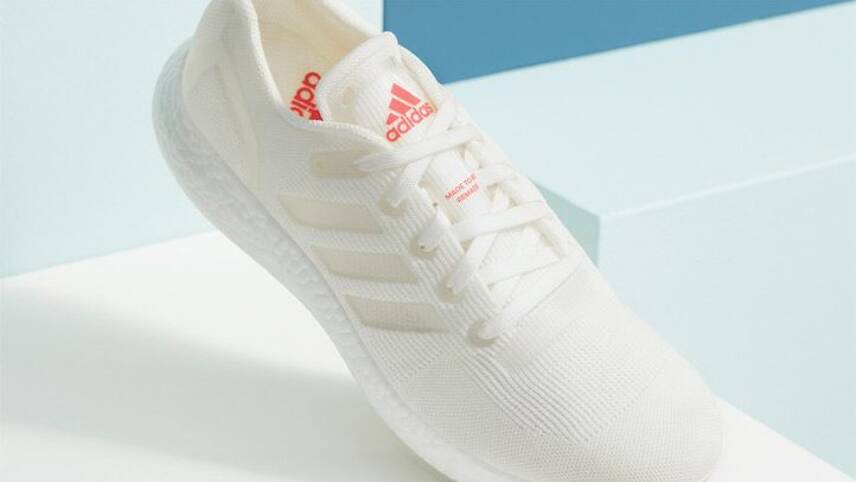Register for free and continue reading
Join our growing army of changemakers and get unlimited access to our premium content

'Made to be Remade' is Adidas' tagline for the model
Adidas revealed on Wednesday (14 October) that it is handing out 1,500 prototype pairs of a shoe called the UltraBOOST DNA LOOP, which is made from a single type of plastic and does not contain any glue. The trainers are designed to be easily recyclable at the end of their use and Adidas has invested in dedicated recycling infrastructure to take back the shoes.
200 pairs of the first prototype of these shoes were handed out in April 2019, and then, in November 2019, the same 200 people received a pair of the second edition, made using recycled materials from the first batch. Adidas said in a statement that it has used the learnings from these trials to scale up production.
The brand is planning to publicly launch the trainers and potentially other products with similar recyclability and recycled content claims in 2021, under the tagline ‘Made to be Remade’. In the meantime, the 1,500 recipients of a pair will be asked to log their experience through the Adidas app.
“We don’t think of UltraBOOST DNA LOOP as simply a high-performance running shoe, but as an experience where every owner plays a vital part,” Adidas’ vice president of brand strategy James Carnes said.
“To make this a success, we need to understand the human element – how people can be encouraged to return the shoes to be recycled – because while we control the creation, we can only influence what happens when the shoes leave us.”
Adidas is notably working to remove all virgin plastic components from its products and packaging by 2024. It is currently designing alternatives made using post-consumer recycled, pre-consumer recycled and compostable materials, including ocean plastics and mechanically recycled yarn.
Feel Good
The other big shoe-related sustainability announcement for the week comes from UGG, which has launched a new website showcasing its responsibility commitments, including several new targets.
Under its responsibility strategy, Feel Good, the brand has committed to set science-based emissions reduction targets by 2021. The global fashion sector is estimated to create more emissions than aviation and, like all sectors, is having to adapt to align with the Paris Agreement.
Feel Good also contains a commitment to increase the brand’s use of recycled, repurposed, plant-based and bio-based materials by 35% by 2027, against a 2019 baseline. The brand’s most-used textile at present is re-purposed wool. It is notably looking to scale up the production of a patented plush material made by blending recycled wool with TENCEL lyocell and fixing it to a recycled polyester backing.
Additionally highlighted is UGG’s work on regenerative farming. The brand, owned by Deckers Brands, will soon launch a partnership with non-profit the Savoy Institute to implement regenerative practices across wool supply chains. Regenerative methods are fast becoming a key talking point in the fashion space, with new measures having recently been announced by Patagonia, Timberland and Tommy Hilfiger.
As for social sustainability, the new site details UGG’s commitments to gender equality, justice for the LGBTQ+ community and maintaining human rights across supply chains. Its parent company Deckers Brands has notably aligned its responsibility strategy to the UN’s Sustainable Development Goals (SDGs).
“These are critical times when we must all play our part in delivering the SDGs and the Paris Agreement through a future which is sustainable and resilient,” Deckers Brands’ president and chief executive Dave Powers said. “We believe in transformative change – change that is only possible with a focused and transparent approach.”
UGG was founded in and is headquartered in California, which has seen more than four million acres of land burned in wildfires this season. Scientists believe the fires were made more than twice as likely by climate change.
Sarah George


Please login or Register to leave a comment.